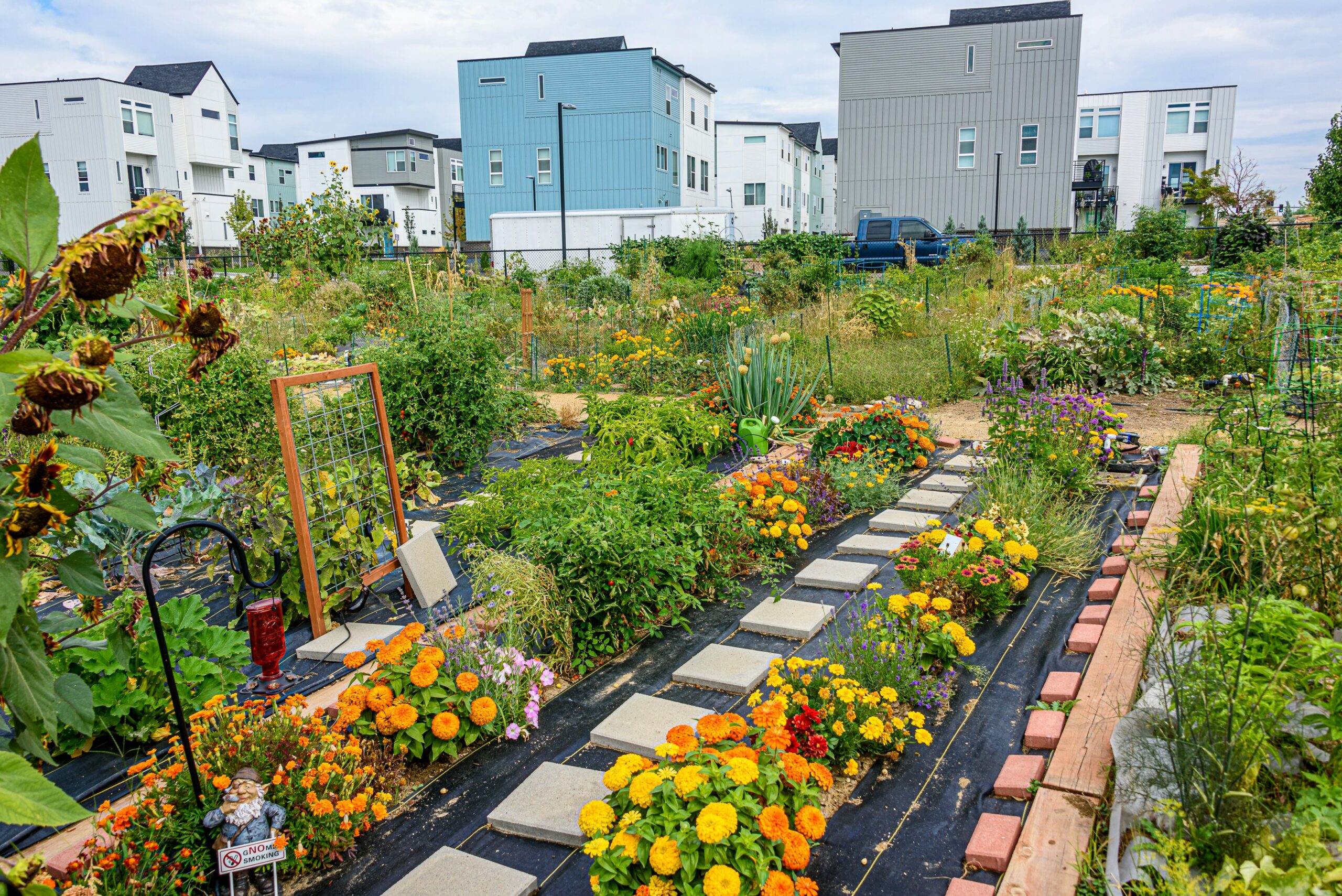Building Capacity for Transformative Climate Action in Eastern L.A. County

On January 11, 2024 the California Strategic Growth Council awarded Pomona ACTS (Activated for Community Transformation and Sustainability) with a Transformative Climate Communities (TCC) grant of $22 million. The TCC program is among one of the only state programs that funds community-led multibenefit climate infrastructure projects in the most pollution burdened neighborhoods. With this TCC grant, Pomona ACTS will advance a vision of a healthy, vibrant, equitable, and resilient Pomona, responding to the challenges of climate change while creating opportunities to improve public health, shared prosperity, and community identity.
Among the attendees gathered at Pomona Civic Center Plaza to accept the award were community-based organizations such as Day One and the Latino/a Roundtable, city and county officials, and the lead organization The Energy Coalition. It was a historic day for the community who had been working towards this moment for years. So, what did it take to arrive at this pivotal moment where the partnerships, community-based organizations’ capacity, and community’s vision for climate resilience coalesced to make this opportunity possible?

Tackling Barriers to Advancing Community-led Climate Solutions in Eastern L.A. County
The Greenlining Institute works with communities of color to connect them with opportunities so they are able to actualize their visions for community-led change. Over the course of this place-based work, one essential factor stands out: investing in the capacity building of local community-based organizations is key to moving forward community-led climate solutions.
Greenlining began working with community-based organizations in Eastern Los Angeles County in 2021 to bridge the gap between community capacity and critical climate funding opportunities. We work across eight cities and four unincorporated regions. Eastern L.A. County is diverse and is characterized by large immigrant populations, Asian Pacific Islander, and Latinx communities. The region also sits at the frontlines of increasing climate impacts. The L.A. County Climate Vulnerability Assessment has identified extreme heat as a key issue in the region and highlights populations in Eastern L.A. County as being particularly vulnerable to the impacts of extreme heat. In addition, California has identified communities in the region as disproportionately burdened by pollution. In Pomona, over 50% of census tracts rank within the top 15% of communities facing the highest pollution burdens according to CalEnvironScreen 4.0.
Despite these vulnerabilities, Eastern L.A. County has received less climate investments to tackle the climate crises compared to other parts of L.A. County, with only an estimated 1.46% of investments directed to the region. That is 1.46% for the region’s more than 1 million residents. While investments are intended to reach priority populations with critical climate funding, low-income communities and communities of color in Eastern LA County are still being left behind as they continue to face clear barriers to tackling the climate crisis.
Eastern L.A. County also lacks a robust infrastructure of climate justice organizations that can effectively advocate for community-led visions. So while our community partners in the region have long held the desire to pursue funding opportunities to advance climate equity work, the limited availability of resources, support, and capacity has hindered their ability to do so. This is due to the legacy of policies like redlining that have resulted in cycles of disinvestment in communities of color, as well as saddling them with disproportionate impacts of climate change.
However, many existing organizations in the region hold deep histories and expertise in immigrant rights, housing, and youth justice. They see climate change as an intersecting issue with their current advocacy efforts including workers’ rights, immigrant rights, food security, and economic justice. These organizations have also built deep trust and relationships with community members over the past several decades, cultivating the grassroots momentum necessary to move policies and projects forward. Greenlining is therefore also focused on building new leadership by centering community-based organizations who are on the frontlines of the impacts of climate change but who are not traditionally thought of as climate-focused.
Greenlining’s Vision to Support Capacity Building in Eastern L.A. County
To help bridge the gaps our partners in Eastern L.A. County face, Greenlining’s approach to capacity building is focused on investing directly in the capacity of local leadership and fostering a connected and supportive network of advocates. Our vision is that this work will pave the way for these organizations to successfully advance their visions for climate resilience and equity.
We support communities to identify their own needs, develop partnerships, build skills, and advance projects, grants, and policies through the following strategies:
- Partnership & Vision Development. Greenlining brings stakeholders together around shared visions for greater collective impact. By facilitating a collaborative process grounded in community voices, we build the long-term trust and multi-sectoral relationships necessary for local transformation. Through these partnerships, we can then support communities to identify shared priorities and project ideas.
- Community Planning & Technical Assistance. To make those project ideas come to life, Greenlining supports our partners in identifying, aligning, and seeking out policy and funding opportunities at the local, regional, state, and federal levels. We offer technical assistance–such as facilitation, coordination, project management, grant writing and partnership management–to develop and align multi-benefit projects with available opportunities.
- Policy & Advocacy. Greenlining engages local partners in our California policy agenda. We advocate for equitable policies that address climate change, strengthen local economies, and improve the health of communities of color. Greenlining’s policy expertise on climate and economic equity, combined with the collective knowledge held within under-resourced communities, inform policy solutions to transform systems.
Greenlining worked with our partners in the region to develop and strengthen their capacity to engage in climate equity work and secure much needed climate investments. Our goal was not only to build new climate leadership in Eastern LA County, but also to contribute to the overall capacity of the region to draw down and implement state and federal dollars effectively. Our theory is that by employing these strategies, we can enhance community capacity over the long term to advance neighborhood climate solutions that are transformative.
Investing in Trust, Partnerships, and Climate Education
We envisioned that our efforts in capacity building would pave the way to pursue climate funding opportunities in Eastern L.A. County, but did not anticipate that such a big opportunity in the form of the TCC grant application would be right around the corner. To address the lack of investments in the region and need to increase capacity of local CBOs, Greenlining partnered with the Latino/a Roundtable, the National Day Laborer Organizing Network and Lopez Urban Farm to co-develop a Climate Justice Education Series in 2022 to support stakeholders with the capacity, resources, and partnerships needed to realize local visions for climate resilience and equity. The Education Series had the following primary goals:
- Center organizations and bring together stakeholders who have not been traditionally part of the climate conversation such as immigrant rights organizations
- Connect leaders in Eastern L.A. County to build collective people power, and develop a common language to pursue climate funding opportunities
- Increase community ownership over climate solutions including language justice to effectively engage in participatory planning, and policymaking at the local and state levels
Over the course of eight months, we worked closely with our three partner organizations to co-develop the workshop curriculum, and brought together 17 individual climate leaders to participate in the 6-part workshop series. Participants included residents, day laborers, students, urban farmers, and economic justice advocates.

At the conclusion of the workshop series in April 2023, we continued to work with partners and participants to develop Community Needs Assessments to identify climate priorities and potential solutions. Across the board, our partners highlighted the connections between climate, economic justice, immigrant rights, food security, and transportation equity. They developed ideas for potential climate infrastructure projects–such as equitable electric vehicle infrastructure, active transportation and urban farming–that also provide economic opportunity, training, and jobs for residents.
Transformative Climate Communities
After wrapping up our Climate Justice Education Series in April 2023, the City of Pomona began preparing to submit a TCC Implementation Grant. This followed the completion of the TCC Planning Grant in the fall of 2022 and efforts to pursue the implementation grant by community partners amidst an uncertain future for climate investments across the state. The grant came at an opportune time as our partners had already identified climate priorities and projects through their Community Needs Assessments developed through our workshop series over the last year. When the TCC opportunity arose, Greenlining was able to quickly mobilize our existing partnerships and project management capacity towards the collaborative grant application. We stepped into the role as an intermediary between our community partners and the lead applicant to ensure meaningful involvement of our partners. We supported our partners through the application process, provided technical assistance, and strengthened the capacity of these groups to engage throughout proposal development. Additionally, we successfully worked with our community partners to advocate for specific community-identified climate projects such as urban farms, electric vehicle charging stations, an electric bike share program, two resilience centers, and community-led outreach campaigns.
The results were a proposal that centered community ownership and community decision-making of climate solutions through the selection of projects, a robust collaborative stakeholder structure, community engagement plan and anti displacement policies to ensure community members receive the direct benefits of the projects. Our existing community partners (Lopez Urban Farm, Latino/a Roundtable, and Day One) are among the eight co-applicants that will be working to connect residents to transportation, renewable energy, green infrastructure, and improved community health across Pomona ACTS nine projects.

Just like Pomona, numerous communities across California have invested significant time and effort over several years getting ready to pursue climate funding opportunities such as the Transformative Climate Communities Program. At Greenlining, we work to ensure communities are able to access community-led climate funding opportunities. Achieving this goal will require continued state funding for climate equity programs, including TCC. However, the 2023-2024 California Budget proposal zeroed out funding for the Transformative Climate Communities Program, and no funding has been restored yet. Currently, there are over a dozen communities with TCC planning grants seeking to apply for future TCC implementation grant cycles to turn their transformative climate visions into reality. That’s why Greenlining is strongly urging the restoration of funds for the Transformative Climate Communities program to ensure that all communities across California have the opportunity to drive transformative change in their neighborhoods.
The Results
Our community partners were able to engage at this level because they were ready. Over the last two years, we spent the time needed cultivating trust and partnerships for a shared community vision. We provided passthrough funding to build the capacity of our partners and provided stipends to workshop participants to support their engagement. We invested in climate education learning about the critical climate issues impacting the region and the climate funding ecosystem through which projects can be funded.
Through TCC, our partners will be leading transformative change in their communities. But this is just a start. Our partners will be able to leverage the funding for additional climate funding opportunities that will leave a legacy for generations to come.




